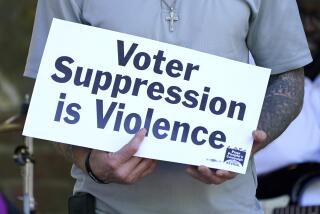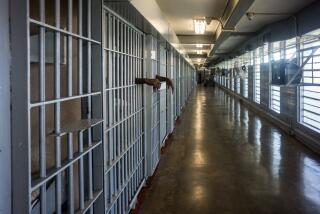Double jeopardy issue: Court OKs some trials after vote to acquit
- Share via
WASHINGTON — The Supreme Court has limited the Constitution’s protection against double jeopardy in cases involving multiple charges and a deadlocked jury.
In a 6-3 decision, the court ruled Thursday prosecutors may try again to convict a defendant of murder even after jurors in his first trial vote to acquit him of murder -- but split on whether to convict him of a lesser charge of manslaughter.
Chief Justice John G. Roberts, speaking for the court, said a defendant is protected against retrials only when the first jury has rendered a “final decision” on the charges against him or her.
Alex Blueford, an Arkansas man, was charged with murder, manslaughter and negligent homicide in the death of his girlfriend’s 1-year-old baby. Blueford maintained the child died in an accidental fall.
After hearing the evidence, jurors reported being “hopelessly deadlocked,” although they had voted unanimously against the first-degree murder charges. When jurors were unable to agree on a verdict, the judge declared a mistrial.
In Blueford v. Arkansas, the high court said the Constitution does not protect a defendant from being tried again for murder. “The jury in this case did not convict Blueford of any offense, but it did not acquit him of any either,” the chief justice said. “As a consequence, the double jeopardy clause does not stand in the way of a second trial on the same offenses.”
Justices Antonin Scalia, Anthony M. Kennedy, Clarence Thomas, Stephen G. Breyer and Samuel A. Alito Jr. agreed.
The decision will have an effect in states such as Arkansas that require jurors in all cases to render a single verdict. Lawyers in the case said many other states, including California, allow juries to render a partial verdict on some charges, even if they cannot agree on all the charges. If a defendant were acquitted under those circumstances, he or she could not be retried on those charges.
In dissent, Justice Sonia Sotomayor faulted the court for weakening the historic protection against double jeopardy. This rule “unequivocally prohibits a second trial following an acquittal,” and the trial judge in Blueford’s case should have ruled he had been unanimously acquitted on the murder charges, she said.
“This case demonstrates that the threat to individual freedom from reprosecutions that favor states and unfairly rescue them from weak cases has not waned with time. Only this court’s vigilance has,” she wrote. Justices Ruth Bader Ginsburg and Elena Kagan agreed with her.
ALSO:
Hurricane season 2012: Prediction calls for ‘near normal’
‘Unabomber’ Ted Kaczynski: Harvard alumnus updates his Class of ’62 profile
Victim of the digital highway: New Orleans paper will print only 3 days a week
More to Read
Sign up for Essential California
The most important California stories and recommendations in your inbox every morning.
You may occasionally receive promotional content from the Los Angeles Times.











